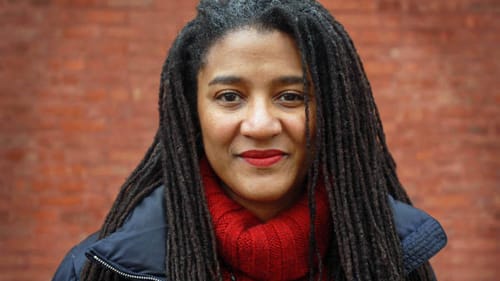Stay in the Loop
BSR publishes on a weekly schedule, with an email newsletter every Wednesday and Thursday morning. There’s no paywall, and subscribing is always free.
A New York state of mind
The curious case of David Patrick Stearns, 'Oslo,' and the 2016 Pulitzer Prize for Drama

Last weekend, David Patrick Stearns’s Philadelphia Inquirer review of J.T. Rogers’s new drama Oslo caught my eye. First, as you can hear here, the show was developed in Philadelphia at PlayPenn; second, I’m always interested in work about Israel; third, Stearns asserted he wouldn’t want to see the show without “New York-caliber actors” and that it should have won this year’s Pulitzer Prize for Drama. [Ed. note: Online, Stearns later changed "Pulitzer Prize" to "Tony."]
Picking a winner
First, a little background information. As pretty much anyone who’s had recent contact with me knows, I was a juror on this year’s drama Pulitzer committee, alongside Jesse Green, Jonathan Kalb, Annie Baker, and our chair, Elysa Gardner. While serving on the committee, after over a decade of reviewing theater for the Inquirer, I decided to shift my full attention to Broad Street Review. So, that one-two punch of a Pulitzer dis and insult to Philadelphia’s deep-rooted theater community, one whose performers, directors, and designers rank among the best in the country (trust me, I’ve seen a lot of regional theater), really stung.
This year’s Pulitzer winner, picked by the Pulitzer board from our four recommended scripts, was Lynn Nottage, for her Pennsylvania factory-town drama Sweat, marking the first time a woman -- let alone an African-American woman -- has won twice (her prior award was for 2009’s Ruined). We chose from around 90 entries that varied wildly in theme and scope, from solo performances to 14-person historical quasi-reenactments such as Oslo. Playwrights included first-timers (one, Sarah DeLappe, was a finalist), never-awarded long-timers, and a few previous winners.
Aside from Sweat, our top picks were Taylor Mac’s astonishing, glorious, maddening, 24-hour-long A 24-Decade History of Popular Music; DeLappe’s highly aerobic teen-girl sports drama The Wolves (my description, by the way, sells it short; get your hands on a script and see for yourself); and Dominique Morisseau’s powerful, understated Detroit-factory-closing drama Skeleton Crew.

I don’t want to reduce Nottage’s historic (and herstoric) win, because she wrote a fine play that wrestles with contemporary issues from several well-crafted angles and it deserved a top spot. But while I wouldn’t speak for anyone else on the jury, I will say that of these finalists, I believe Sweat was the most conventional choice. Throughout, I hoped for either a Mac or Morisseau win. But I’m not complaining. It’s been a professional goal of mine to, if not win a Pulitzer, then at least help choose one, and I can now cross that off my lifetime to-do list and feel good about my role in the process. (Pulitzer board: if you’re reading, I’d be happy to do it again any time.)
Pride and pessimism
So, what of Oslo? Drama Pulitzer submission guidelines state that the award goes to “a distinguished play by an American author, preferably original in its source and dealing with American life." This marks a strike against Oslo from the start, since it concerns secret negotiations between the Israeli government and the Palestinian Liberation Organization (PLO), navigated in Norway as a way to keep the U.S. out of the picture. Nonetheless, Oslo did make the journey from my massive script pile at home into the winnowed-down favorites pile that topped our committee’s bargaining table. But to me, at least, it read more like a 20th-century relic than one with an important lens on our present.
I also saw Lincoln Center’s Bartlett Sher-directed production last weekend, and onstage its solid structure and lively, engrossing dialogue stood stronger than they did on the page (though Rogers doesn’t reach far for laughs; Israeli deputy foreign minister Yossi Beilin, played by Adam Dannheisser, “can’t eat anything spicier than gefilte fish” and everyone else trades ethnic jokes to lighten the mood). But still, it didn’t show anything new. Worse, Rogers’s intended message – that maybe the Oslo Accords were good in the long run, or maybe not, but at least two enemies sat at the table and shook hands – seemed frustratingly simplistic.

Oslo’s coda, which recounts subsequent developments – Hamas’s Gaza win, the Second Intifada, Yitzhak Rabin’s murder – does admit some defeats. But I walked away feeling angry about just how vulnerable we all are, subject, always, to the whims and bloodlust of prideful men. Yes, they shook hands. So what?
Bringing it back home
Michael Yeargan’s set and Catherine Zuber’s costumes clothe the Norwegians and the stage in varying tones of "greige," aggressively courting the myth of the importance of neutrality. The furrow-browed, rarely smiling Norwegians, delicately tiptoeing around a volatile passel of screaming Arabs and Jews, bring to mind a line from another politics-minded Pulitzer contender, Hamilton: “If you stand for nothing, what will you fall for?”
The most interesting characters – and by far most memorable performers – were two of those screaming Middle Easterners, PLO finance minister Ahmed Qurei (Anthony Azizi) and Israeli Foreign Ministry director-general Uri Savir (Michael Aronov), who arrived as enemies and left as lifelong friends. Perhaps, with less neutrality on the part of the Norwegians, they might have accomplished something greater than a too-brief break in leadership-sanctioned murder and mayhem.
Anyway, about those “New York-caliber” actors: Sher didn’t appear to require any special performative gymnastics; actors were somber, enraged, or ecstatic. Also, if Stearns wasn’t sure he’d want to see the play with lesser actors, what does that say about its Pulitzer-worthiness?
As I watched, I found myself casting each role with area performers whose work I’ve admired over the years. It was easy: A cast of 14, all middle-aged, with five white guys, three white women, four Jews, and two Arabs? Come on. New Paradise Laboratories founding company member Jeb Kreager is already in the New York cast. It’s a Philly-caliber show, for sure; it’s just not a Pulitzer-caliber one.
What, When, Where
Oslo. By J.T. Rogers, Bartlett Sher directed. Through June 18, 2017, at the Lincoln Center's Vivian Beaumont Theater, 150 W. 65th Street, New York, New York. (212) 239-6200 or lct.org.
Sign up for our newsletter
All of the week's new articles, all in one place. Sign up for the free weekly BSR newsletters, and don't miss a conversation.

 Wendy Rosenfield
Wendy Rosenfield